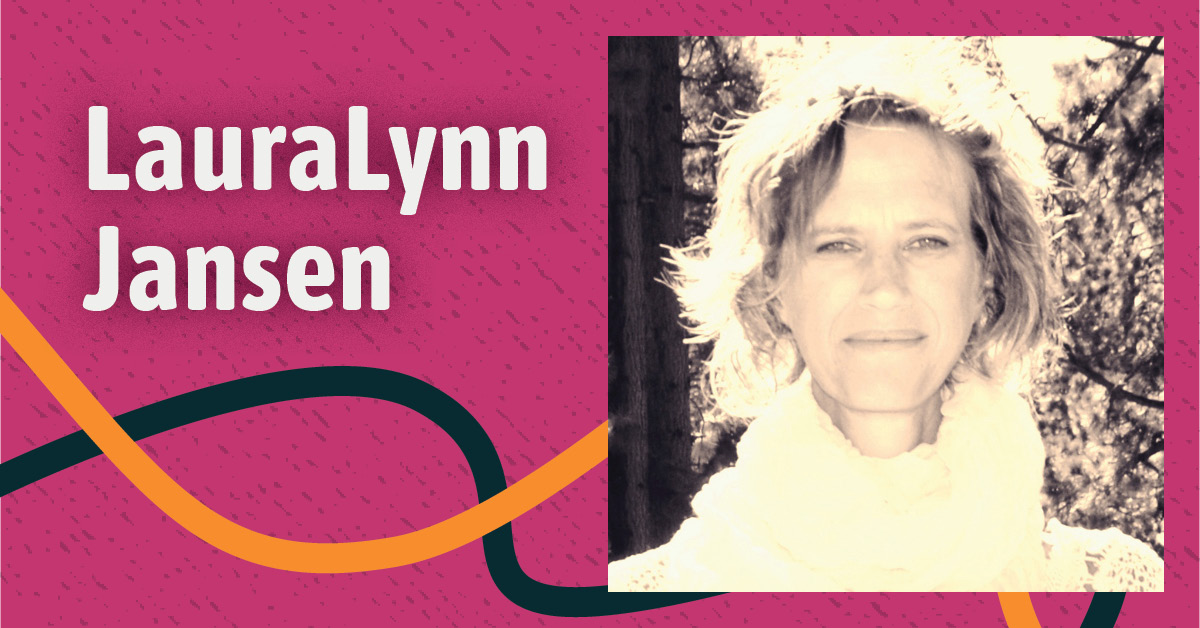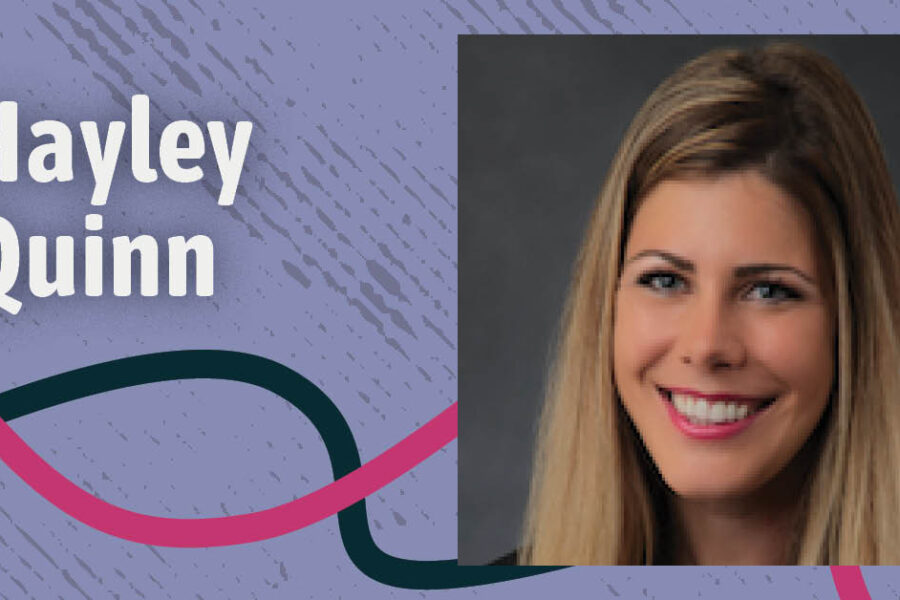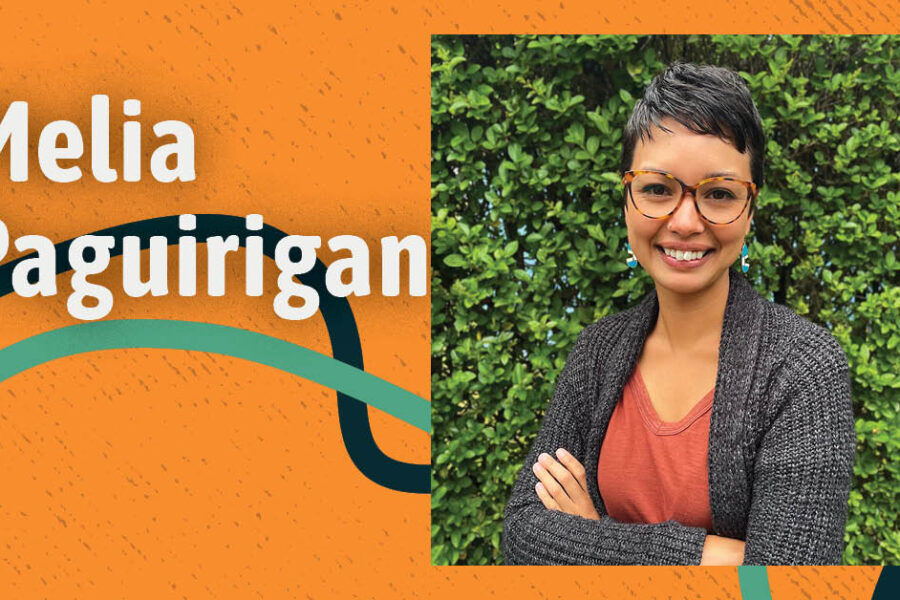For many parents, watching their child graduate from college is a peak life experience—and all the more so if that child attended the same college as the parent once did. The parent has succeeded in helping the next generation to have the same advantages that they did. It’s a triumph of the nuclear family.
For LauraLynn Jansen, a third-year student in Antioch’s PhD in Leadership and Change, parenthood and all of its difficulty and excitement are not part of her path. An early struggle with cancer made it so she couldn’t carry a child herself. And the US Military’s anti-LGBT policy known as Don’t Ask Don’t Tell forced Jansen and her longtime partner Shannon (today a colonel in the Air Force) to keep their relationship secret for almost a decade-and-a-half.
But it was precisely these forces that brought Jansen to become deeply involved in advocacy for foster children. As she explains, “If I couldn’t raise children on my own, this is another way that I could contribute to those generations.” Jansen today works as the Executive Director of HerShe, a nonprofit that runs summer camps and provides individualized mentoring to girls in foster care to help them successfully transition into adulthood.
And a handful of years ago she did, after all, have that thrilling experience of watching a kid she had deeply invested in graduate from college. One of the girls she spent years mentoring through HerShe ended up attending San Francisco State, where Jansen had received her own bachelor’s degree. Jansen made a special trip to San Francisco so that she could watch this young person, who had already beaten so many odds, receive her diploma and step forward into the next chapter of her life. “[It] was amazing,” says Jansen. “I had such a time. And it was at my alma mater!”
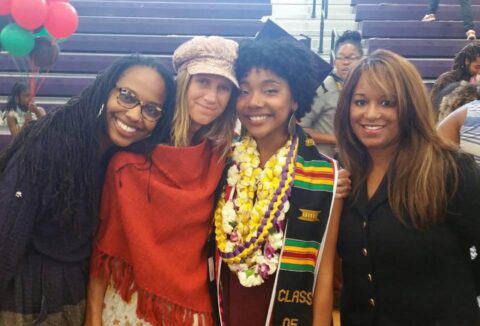
Jansen has for a long time now worked with HerShe to be a powerful force for good in the lives of the foster children she helps. Today, she’s using her studies at the Graduate School of Leadership and Change to expand and strengthen HerShe and to bring its potential to more girls and women. She’s also a yoga activist, providing traditional yoga offerings as a holistic practice through an organization she founded called the Yoke, which hosts a vibrant website and also has multiple organizational offerings. And she’s in the process of re-issuing her memoir in a new edition where she’s finally able to be open about her identity as a queer woman.
Of course, it’s not always been an easy journey to feel comfortable with her identity, to hone these skills, and to have the confidence to share her vision widely. But it’s exactly the difficulties of the journey that have made Jansen today such a vibrantly and passionately involved activist working to make the world a better place.
A Deadly Illness
Jansen grew up in Wausau, Wisconsin, a city of 40,000 right in the center of the state. Growing up there, she says, “I never saw gay role models.” She didn’t even have the words “gay” or “lesbian” as concepts in her vocabulary. “All I knew,” she says, “is I thought that Boy George was really cool.”
In the early ‘80s, she went away to begin college in Eau Claire, a slightly larger city 100 miles to the west of Wausau. That was when, as she puts it, “I first really clued in.” But she knew from her upbringing that homosexuality wasn’t right, and she worked to resist her innate attractions. “I tried to date guys,” she says.
Soon she moved to more liberal Madison, then left school and moved to Los Angeles, where she worked in a record store, was a model, dated a DJ from the popular KROQ radio station, and spent time partying backstage at LA rock concerts. She was twenty years old, figuring out her life, living in Huntington Beach.
This fun adventure came to an abrupt end when she was diagnosed with cancer and told she had only a fifty percent chance of surviving. Like that, her glamorous lifestyle disappeared. As she says, “It was just a total flip.”
She ended up moving north in California to Sacramento, where she received chemotherapy and other treatments at UC Davis Medical Center. In this new town, she first lived with her father and his new wife. (He had recently divorced Jansen’s mother and moved out west.) Then, when that living situation fell apart, she was partly homeless, sheltering in a friend’s father’s backyard pottery studio. All the while, she wasn’t sure if she was going to live much longer.

During this crisis, Jansen began learning about non-Western forms of medicine and wellness. Her aunt Faith told her about meditation and led her to the herbal school and apothecary Rosemary’s Garden, in Sebastapol. Jansen’s curiosity was piqued. She bought books and began meditating and learning about a practice known as yoga. At first, she focused on the more inward practices involving meditation and using mantras to focus the mind. Yoga back then was not yet a byword for a popular exercise product with strip mall chains and branded athleisure onesies. “This was before yoga mats, yoga studios,” she explains. “It was before the internet. It was way the hell back in time.”
Eventually, with a combination of integrative practices including the soma, mind, and spirit along with Western medicine, she survived cancer. But she didn’t give up the spiritual practice she’d found along the way. She continued her meditative, inward yoga practice—and then after a decade began exploring āsana, the branch of yoga that involves stretching and poses. In the ‘90s she went and lived on an ashrama in India, where she became a certified yoga teacher. Yoga would continue to be a key part of Jansen’s life.
Honesty Around Identity Leads to Discrimination
As she put her life back together in the early ‘90s, Jansen decided to finish her undergraduate degree. She enrolled at San Francisco State University, in their Women’s Studies program. Although when she started the program she had a boyfriend, the simple fact of where she was living and what she was studying finally forced her to accept and embrace her identity and what sorts of people she was attracted to.
“I was in a Women’s Studies program at San Francisco State,” she says. “So it was nearly impossible to deny what I was… Anybody who’s lived in San Francisco and had some Women’s Studies would understand what I’m talking about. There was no way I could deny it.”
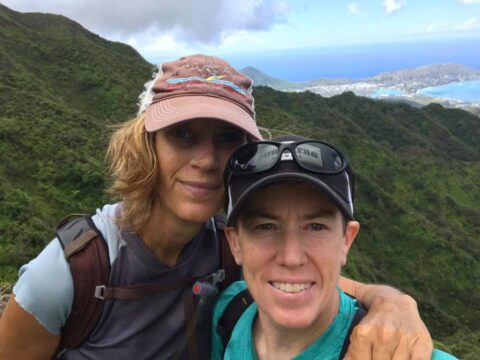
Coming out as a queer woman wasn’t easy. Her father refused to speak with her for six whole years. And later, once she began seeing her partner Shannon, they faced explicit discrimination from the government. Shannon was an officer in the Air Force and thus subject to the Don’t Ask Don’t Tell policy. This meant that if they were open in any way about their relationship, Shannon would have not only lost her job but also received a dishonorable discharge and likely been disqualified from Veterans Administration benefits like health and education. So for a decade-and-a-half, they had to keep their partnership concealed from many of their friends.
Of course, Jansen’s life got better in so many ways after she allowed herself to date the people she was truly attracted to. And things improved even more after Don’t Ask Don’t Tell was repealed in 2011 and then when in 2015 gay marriage became legal across the US. But the challenges of growing up queer in a world that discriminates against all manner of LGBTQ+ folks left a deep impression on Jansen. She describes the feeling as “being on the outside of things, and not having a place where you feel like you fit.” It helped her have deeper empathy for other people who the world discriminates against and fails to fit in.
Building Leadership at HerShe
“Incarceration the first year post-emancipation is nearly 90%,” says Jansen. She’s describing the incredible hurdles that foster children face when—not having been adopted or reunited with their families of origin—they end up aging out of the foster system without any support system in place. Not only do so many of these young people end up entangled in the criminal justice system, but they routinely face homelessness and all of the dangers that come with being unhoused: sexual violence, drug exposure, and the physical toll of sleeping rough. It’s hard to live within a society when, at the moment you turn eighteen, no one is looking out for you.
“All the connections that we create in our lives through family and so forth that gives us a kind of stable ground, they don’t have,” explains Jansen. That’s a big part of why Jansen has spent over a decade pouring herself into HerShe, a nonprofit that puts on summer camps and provides mentorship to girls in the foster system with the explicit goal of helping them successfully transition into adulthood.
“HerShe focuses on providing a safe environment where foster girls are supported in their personal development while surrounded by a community of HerShe sisters,” says Jansen, who now serves as the nonprofit’s Executive Director.
HerShe was founded by Kenadie Cobbin-Richardson, who remains deeply involved with the organization. Cobbin-Richardson had a roommate who was a former foster youth, and this experience revealed to her the extreme challenges that youth aging out of the system face. It inspired her to start the camp, and she soon connected with Jansen, who had experience developing youth leadership programming. That was in 2004, and Jansen has been overseeing curriculum development and leadership programming every since.

The camps vary in population and length based on funding and connections, but they are always held in Southern California and each year reach about 25 foster girls in the high school age range. The first year the programming is largely about “authentic leadership, almost self-leadership,” says Jansen. But ideally, girls return to future camps and get to experience the second year—which is “mostly based on relational leadership.” And if they return a third time, the girls become co-leaders of the camp, helping to lead the programming. Jansen calls this third year “embodied leadership.”
Although the COVID crisis has now twice thrown a wrench in plans to hold Camp HerShe, the dream for the program is that girls will be able to return year after year, tracking each year of high school. In that plan, explains Jansen, “senior year they have a professional life coach, which is usually me, to support them in preparing and creating a vision for what they want beyond emancipation.” Ultimately, HerShe is designed to be a four-year program that powerfully alters the course of these girls’ lives, helping them to avoid the risks that derail the lives of so many foster youth in their position.
Bringing Her Project to Antioch
When the US military’s Don’t Ask Don’t Tell policy was rescinded, Jansen and her partner Shannon were able to bring their relationship out of the shadows. As a fully recognized military spouse, Jansen was now able to live on-base with Shannon—and Shannon was free to share her GI Bill benefits with her spouse. When Shannon became a group commander, which entailed hard work and long hours, it was a natural time for Jansen to start a PhD. She enrolled in the PhD in Leadership and Change at Antioch University.
Jansen is getting the PhD not out of a strong desire for another degree. Rather she is using the project of getting her doctorate to focus on developing the HerShe organization under the guidance and mentorship of her teachers in the program.
So far this plan of developing HerShe through working through her PhD has been a great success. For instance, Jansen completed the program requirement of writing a Nature of Leadership paper by closely examining the self-development exercises and collaboration-based activities of the camp’s programming at its three main levels. This helped her gain a clearer conception of how the three levels are individualized and how they build on each other. Explains Jansen, “Through the [Nature of Leadership paper] I identified the generative mechanisms within each level and then used them to create a match to different leadership theories.”
By focusing on a project she was deeply passionate about, she was able to dive deeply into the theories and literature about leadership that forms the backbone of the PhD program. Along the way, says Jansen, “I was able to provide some academic backbone to our curriculum.” And the paper ended up being twice as long as it was required to be. It was a stand-out.
For her next big project in the program—the Change Project paper—Jansen decided to focus more on the future and how HerShe can keep growing and evolving. She ended up coming up with a proposal to found a HerShe Institute that can offer programming not just for youth but also for adult women. The dream is to make HerShe even more of a thriving community that helps its members at every level to thrive and achieve their goals.
For herself, though, Jansen is leveraging the PhD program to generate and build out these ideas. “I’m absolutely where I’m supposed to be,” she says. “And every paper I’ve written so far has let me clarify, develop, elaborate something either around my role as a leader within HerShe or [around] HerShe itself.”
Protecting the Present and Building the Future
One of those developments to the structure of HerShe that has already come out of Jansen’s studies is a new group within HerShe called the Circle of Guardians. Jansen calls it a “think tank with heart and soul.” It is a group so far of seven women who have been involved in HerShe either as alumnae or as facilitators. And their mission is to support the evolution of the program from consisting solely of Camp HerShe to now be the HerShe Institute, including programming for all women. There are seven women so far in the Circle of Guardians, and they have already been meeting. They are offering advice and their own ideas.
It was in fact the Change Project that brought these women together. Each one of the women in the circle participated in Jansen’s research for that paper, helping with the survey, helping with interviews, and allowing Jansen to interview them. “It was through all of that,” says Jansen, “I could see their capacity and their willingness to be change agents. That’s how they were invited to be part of the circle.”
And beyond HerShe, Jansen is keeping herself busy in other realms. She is working to release the second edition of her memoir, Inspired to Live: The Story of an Unlikely Rebel. In this update of the initial edition from 2011, Jansen is finally free to discuss openly her sexuality without fear of reprisal from the military.
And she’s also doing work through her yoga nonprofit, the Yoke, which provides different programming at an accessible cost. Currently, she is working to create an alternative 200-Hour Yoga Teacher Training for studios that can’t afford to get the national Registered Yoga School 200 credential.
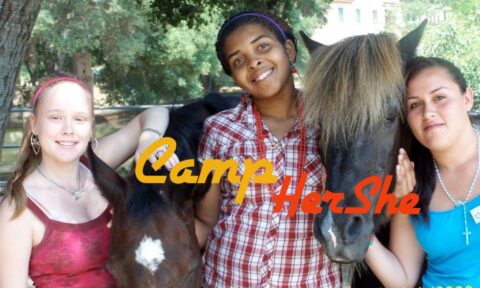 It’s all part of Jansen’s desire to help others thrive. It was a high point to see her former HerShe camper graduate from San Francisco State University, and it’s even more fulfilling that this same young woman is now a member of the Circle of Guardians.
It’s all part of Jansen’s desire to help others thrive. It was a high point to see her former HerShe camper graduate from San Francisco State University, and it’s even more fulfilling that this same young woman is now a member of the Circle of Guardians.
But it’s often the smaller moments of helping girls realize their internal strength and power that move her the most. One way that they try to help girls find this power is by having them work with horses. She remembers a specific example that captured the way these relationships evolve.
When this specific group of girls first came into the corral with the horses, says Jansen, “some of them are freaking out.” Being around big, strong animals like that can be scary. But the horse trainer they were working with that day knew just how to set the girls at ease. “She was like, ‘Yeah, these actually were Michael Jackson’s horses,’” Jansen remembers. “And they’re like, ‘Whoah!’ It kind of took down the intensity of their nervousness around that.”
Eventually, the girls came to see how their energy can affect their relationship with the horse. This is supposed to give them a deeper understanding of the importance of their own self-confidence and bearing, without ever speaking a word. And that day, as a small group of girls worked with Michael Jackson’s former horses, Jansen saw the power of the work she was doing, the work she continues to do.
As she says, “I wish you could witness, over the years, the changes as they start to understand that—and I say this in the most positive light—they do have a power within them, and it hasn’t been taken away.

